Chapter 7. Brain Exercises
7.1 Welcome
Think Like a Scientist
Brain Exercises
By:
Susan A. Nolan, Seton Hall University
Sandra E. Hockenbury
REFERENCES
Ball, Karlene; Edwards, Jerri D.; Ross, Lesley A.; & McGwin Jr., Gerald. (2010). Cognitive training decreases motor vehicle collision involvement of older drivers. Journal of the American Geriatrics Society, 58, 2107–2113.
“A Consensus on the Brain Training Industry from the Scientific Community.” (2014). Retrieved from http://longevity3.stanford.edu/blog/2014/10/15/the-consensus-on-the-brain-training-industry-from-the-scientific-community/
Dahlin, Erika; Nyberg, Lars; Bäckman, Lars; & Neely, Anna S. (2008). Plasticity of executive functioning in young and older adults: Immediate training gains, transfer, and long-term maintenance. Psychology and Aging, 23, 720–730.
Melby-Lervåg, Monica, & Hulme, Charles. (2013). Is working memory training effective? A meta-analytic review. Developmental Psychology, 49, 270–291.
Parker-Pope, Tara. (2014, March 11). Do brain workouts work? Science isn’t sure. The New York Times, p. D2. Retrieved from http://well.blogs.nytimes.com/2014/03/10/do-brain-workouts-work-science-isnt-sure/
Rebok, George W.; Ball, Karelen; Guey, Lin T.; Jones, Richard N.; Kim, Hae-Young; King, Jonathan W.; ... & Willis, Sherry L. (2014). Ten-year effects of the advanced cognitive training for independent and vital elderly cognitive training trial on cognition and everyday functioning in older adults. Journal of the American Geriatrics Society, 62, 16–24.
Tritsch, Shane. (2014, February 15). Brain-fitness industry caters to worried boomers. Crain’s Chicago Business. Retrieved from http://www.chicagobusiness.com/article/20140215/ISSUE03/302159994/brain-fitness-industry-caters-to-worried-boomers
FAQ
What is Think Like a Scientist?
Think Like a Scientist is a digital activity designed to help you develop your scientific thinking skills. Each activity places you in a different, real-world scenario, asking you to think critically about a specific claim.
Can instructors track your progress in Think Like a Scientist?
Scores from the five-question assessments at the end of each activity can be reported to your instructor. To ensure your privacy while participating in non-assessment features, which can include pseudoscientific quizzes or games, no other student response is saved or reported.
How is Think Like a Scientist aligned with the APA Guidelines 2.0?
The American Psychological Association’s “Guidelines for the Undergraduate Psychology Major” provides a set of learning goals for students. Think Like a Scientist addresses several of these goals, although it is specifically designed to develop skills from APA Goal 2: Scientific Inquiry and Critical Thinking. “Brain Exercises” covers many outcomes, including:
- Interpret, design, and conduct basic psychological research: Describe the fundamental principles of research design [recognize difference between objective and subjective measures]
- Demonstrate psychology information literacy: Describe what kinds of additional information beyond personal experience are acceptable in developing behavioral explanations [identify common pseudoscience strategies]
7.2 Introduction
This activity invites you to test the claim that playing brain games on commercial Web sites can make you smarter and, in older adults, stave off cognitive decline. First, you’ll play a brain game similar to those you can find online. You’ll look at claims that often accompany the online games. You will then examine evidence from two studies that explored the effectiveness of brain games and came to contradictory conclusions. You’ll consider an alternative explanation for why one of these studies found evidence for the effectiveness of brain games, and one did not. Finally, you’ll examine the source of the claim we evaluated in this activity.
7.3 Identify the Claim
1
Identify the Claim
7.3.1 Can You Exercise Your Brain?
Have you seen ads online for brain game Web sites claiming that you can improve your cognitive abilities just by exercising your brain? They say you can increase your reaction time, improve your memory, enhance your problem-solving skills, and more. Brain games are big business. The industry earned more than $1 billion globally in 2012 and is predicted to earn more than $6 billion in 2020 (Tritsch, 2014).
We all know what it means to exercise our bodies—to walk, run, or work out. But just what does it mean to exercise your brain? And do the brain exercises you can find online work? Do they make you smarter and improve your reaction time, memory, and problem-solving skills?
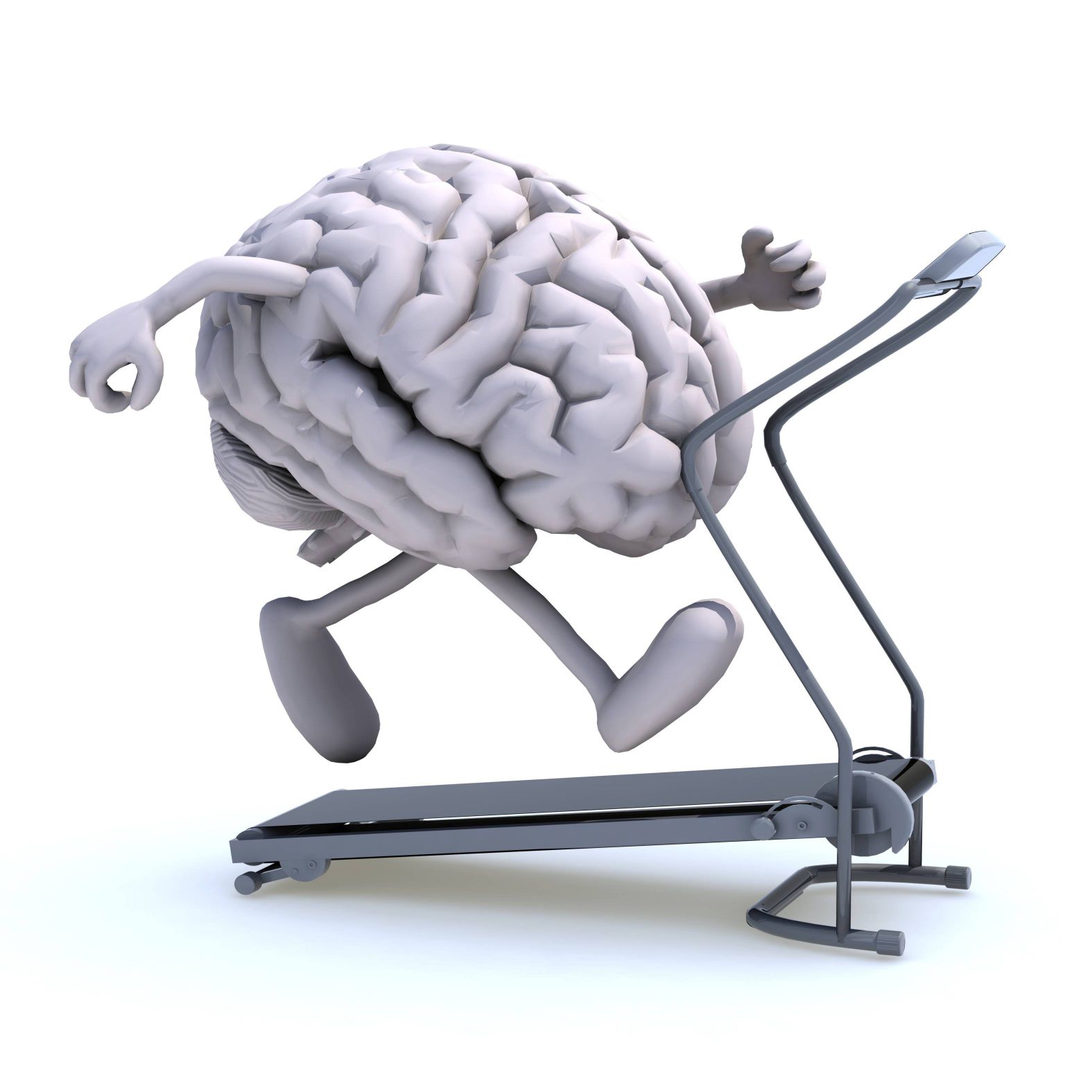
7.3.2 Can Online Brain Games Make You Smarter?
With a quick search, you can easily find online brain exercises. Below is a mock Web site similar to the typical Web sites you might find. It looks a lot like the real ones. What claim is this site making?
Like this one, some real Web sites insist that their brain exercises will help you increase intelligence and avoid the cognitive decline that may accompany aging. Some make even loftier claims: The site brainmetrix.com says one of their brain training exercises “invariably leads to inquiry into the human condition and the essence of humankind as a whole.”
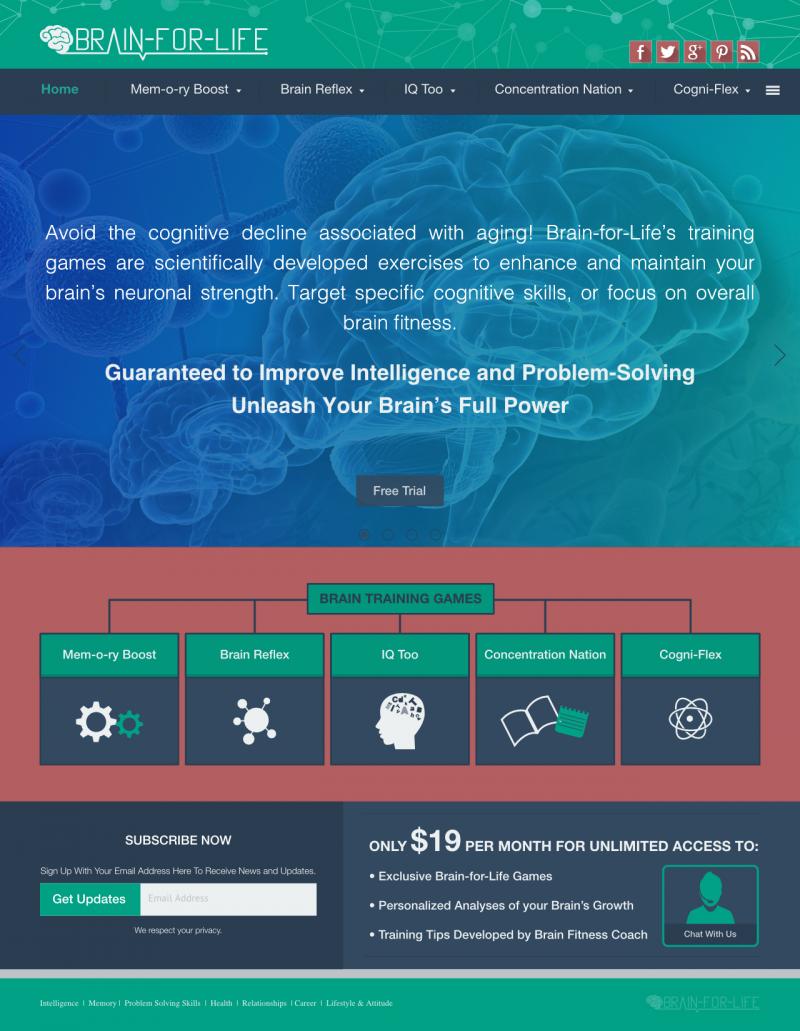
7.3.3 Try a Brain Game
Try this mock brain exercise, based on games actually found on “brain training” Web sites.
You can play the game as many times as you want. We suggest playing at least five times, after which you can move to the next screen.
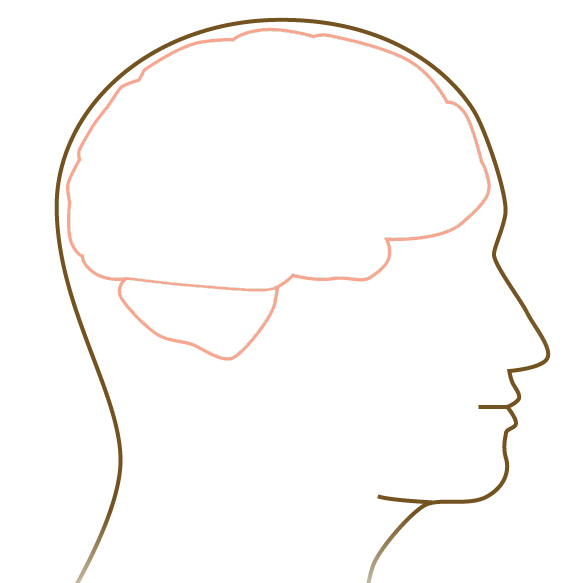
7.3.4 Try Another Brain Game
Here’s another fake brain exercise, based on the many “brain training” games you can actually find online.
Mixed-Up Words
Flex your brain with stimulating mental puzzles! These questions each contain a group of letters and a set of words. As quickly as you can, select the word that contains all the letters listed, and no letters that are not listed. (Letters can only be used once for each instance they appear.)
Question
1EtWjHUSqSRmqY4ZyZjB5O7NPrdf5+zdM3sbVLmIoliLPfV+4HJHXroA6ebUV9MsL2+ffA0RPL9ohuIOmr8eckffd2qvTd4ZpJGKttv7mQIxCAR8zmKYgID3HnyCutMhkpu9Py5ZilnqenogkfWJfMQGk/7EC152kV7IKVrh1QAL2FYFhH5hvQCzCALjGrn1Vo1RdZt6K2VoqMFaWiSfIzSyY4fja7BWPRj54eq9JsmDKSdryYZtYV/i2BJZkQlzBGZpMoU4sjvWbYZHudnzp+ZDWUQyQXvHiVQqf4+MXzvMB2T0GtFEOA+pESAAV9L+VB6+jKfthocXJTARutHvh1a8rpU=Question
ou4Sz6n1dX3ZMAQrK+kPz9Kzgz5ZTdOAihI1kQWUu309gJalew4bq1uVWwQ5dE5FOoBkwaETW45Y8awRQCs8SGXAFi9ot8OgWDwPqw1QZZfxXJZhmHPJQuj8evpHFZSEffnDjygQaZ9aN88no2I+KOqZ2dwOzNGj8LKrAyq9+f0Wtmc0mi6sIdCgIOyjJWbK5X+pcHUru49tb09IdzJ+ZuEwRbdAym4Sd5UqQmJSoJ5wWWsm9U8UjXlsxETMw7lgPisjhsK2v+ORupQLj+ff4LyRzkqthtYSdnel/qCFUF1vCOVIWDodvmSeMSfUiYu67MDMtJakJ99sV0aIxyqOoF/w98t16Ac7LAVworzWrh9gsew6Rj+shw==Question
zKDYbzRvWQiZ/vaxkKkcd9a4igQca8OVl6NStffTKR9NLRSOOVi9ypkvbrqR6aubDR23pIu/ft4rMwRNtd7Z94lqBR0/LngGmF87FalIxvrn5svUqaqm5xh5c92dQuLnSgexOgJVoV1GjmATg3iHJk3H0qmEQoI2gxidPRmehYxbhJnRXcfHsLI+B//H8/NtTu1FNE/ZovAVPAqLoy0QF/fzupM4OvKw+IS9Yftv2eGRURkK2td3/PrMOIrJgYwduEnhwo3HrHvWN2PDHg/tnDWDp+tzLcpMyAjmDEhrEp0ZwA0mWbkTBgYajFViLHH06Ul8JIoLyBVxRhwy7+bBcf1z7N7mWc1nhRGIZOlBqRXCf5xKi4SiJRvfSRw=Question
EcojgTTSwNLQzkrhObNxwug2jneGXu21NKqNc1i0NrrGyd3cHoC4tin35gVX/U9/Tgfrz7R7XQ0aUNi2CULli0KuIKdFsnIvB3oeBrDrpypmzkhV+CAHtBrhmnUaOJVNE/oi7m6gEHS8Q2tJsmG/xo4m7tQ4XP3Ia61cxo37/a+WedQfhI5Bgm7N0mkoMGK/5TpD+tlOqqK6SRR3jAhUKFk7Zlj732DDxmPhH856+IBzcweuaVTlORaNO2KSS3bQU5pKKzVVveO/I0EoCv3ZRcos/f9+bk64jVq6G25TmwyBmhywn2xkNtBKLUeYYPoyKjA6ukVjugoYWSoBy89cwlVF0Yv8iXzkKBla2+XHbFBTem80Question
XEHwRhhYJFK81BxTOYTUkqdPJsbOBA/dI1hUYeEjZLU0geAleogZEGxTtJ0CXOVoz/o/wQNsBYMurl3966DWSviQaF2in3UFBv02iSVUxfkr9LWRgW/vNJenV1Lr765bC3FsDkDWZI/KS2Sen8iadn9RJ1cElbOIiIZR0KaCXtj9kki15vRrBC6eoWxzLX0KUQtpcIgJO/khZsz+uRcT8jmCMmC8fxvx/4aQxeWRjnWOsUJQuCy7QvTjANp5PRtOGlHJk+nanIEbUqjKIkgOGh8ekWr8z+miEsCpx8wjm8ZztOpyH6ptmqkexPD4f0mZAAtXd7OLYswxRWRrapzJeS0J4Qr60luphfuWbQ13eMtVfqWRbuz/9gxxLrQ=7.3.5 What Do Web Sites Claim About Brain Training?
Earlier, you saw a mock “brain training” Web site. Then, you tried two types of “brain training” games, both similar to games that you can readily find online. When you engaged in those “brain training” games, did you feel that your brain was being “exercised”? How would you know? And what would you expect to happen if you engaged in such exercises regularly?
Question
y5d7L+igqGy7c09WlP9lj891NzKLp6oJiaXEvR4ROU8OusjYo7/KsCfbOowoLE+dwg6Bgdad6mqxPpgUGFHgoSRH+rrdPWcsXC4xbJMXAXPSqTPW0XDxvGqDYh+f7PfJl8ai+wKc0Kwnm6QU65cmeZCgOVrn0Vfbh4nxopTd7HMj6gSQwdlCBTZuW8e8CUDW9wrlNugSM1EciH/LR7ea46w9x24LJ09cgZVyXYR2+gbslI8nEMBTie41Y7DDf/4FC/7anyWc4Icp7t+3Pby5RkyuaVlV4Wu2rBK8A42awQD85BjbR538CbBgRNtCpy2BXnAUsgbBq6SlhXswiD9azA18YT64cIQC7.4 Evaluate the Evidence
2
Evaluate the Evidence
7.4.1 Are Brain Games Effective?
Thinking like a scientist involves evaluating information that we encounter, such as claims about “brain training.” As the brain game industry gets bigger and bigger, more people are wondering if these exercises are actually effective. For example, a headline in The New York Times asked “Do Brain Workouts Work?” (Parker-Pope, 2014). But despite reviewing multiple studies, the article ultimately concluded that “the science remains unclear.” How can this be? Doesn’t research usually lead to clear answers? Let’s examine the evidence.

7.4.2 Some Studies Find No Evidence Brain Training Works
In this case, examining the evidence means taking a look at the studies that led The New York Times to report that “the science remains unclear.” Did the studies all reach the same conclusion about the effectiveness of brain training?
The first study we’ll look at did not find evidence that brain games make us smarter. This study was a meta-analysis examining 23 studies that compared brain-training programs with a control condition (Melby-Lervåg & Hulme, 2013). The brain-training programs varied in some aspects but all used cognitive tasks related to working memory. One study, for example, asked participants to remember the last four items from a series of numbers, letters, colors, or locations (Dahlin & others, 2008).
You can try a game like this on the next screen.
7.4.3 Try a Brain Game Related to Working Memory
Do you think playing games like this would make you better at cognitive tasks in general? That is, would you become better at calculating arithmetic problems or decoding words, such as in the second game you played in this activity?
7.4.4 Training Does Not Generalize
Did you guess that memory-game practice would not generalize to other cognitive tasks? If so, you are right! The meta-analysis found that, overall, the training did temporarily improve working memory. But the training did not lead to improvements in cognitive skills more generally. There was no improvement in nonverbal skills, attention, or arithmetic, for example, even in the short term. That is, a brain-exercise game doesn’t make you smarter generally.
The graph here shows the differences between the brain-training (experimental) group and the control group for seven studies that measured arithmetic skills immediately following training. As you can see, most studies effectively found no difference, and the average of them is also close to zero.
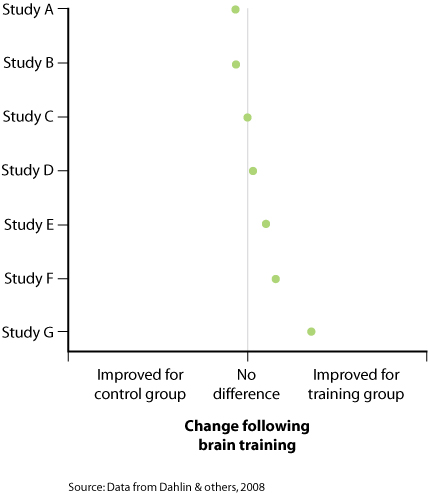
7.4.5 Some Studies Find Evidence Brain Training Does Work
With a conclusion like that, how can the science be “unclear”? Let’s look at a second study that was described in the New York Times article. This research compared three kinds of brain training—memory, reasoning, or speed-of-processing—with a control group that received no training (Rebok & others, 2014). For example, in the group that received reasoning training, participants completed brain exercises that required them to figure out patterns to solve problems. Approximately 2,800 adults participated and were followed for 10 years. The researchers wondered whether brain training would help participants maintain their ability to function independently—to perform what the researchers call “activities of daily living.”
You can try a reasoning game on the next screen.
7.4.6 Try a Reasoning Game
For each question in this game, you will see a sequence of letters and/or numbers. To answer the questions, type in the next letter or number that would appear in the sequence.This requires you to identify the pattern. Respond as quickly as possible.
Question 7.1
A C E G bQS0aa8zcswyscJL28cWcwwNjoGVYKaZaD3PHjGg6DuE8Ix5idQEfeC5VvXJ3l/bopCA/mOHMqODrlP/0j0ZEh8wJqo=
Question 7.2
1 8 15 22 29 UTT87xLkTH9RW9Nl2xkfN4lYcW8zBntCYSiV5FGBO37DXvbVf4T33Yi9ilGuPqrZBthVv3TSuBmGi1TrU4irK+WCkcw=
Question 7.3
A Z B Y C X TugZSlQ3K242aOf93JM17KftdffVAUv8OK1/8LaDvG2MjZGme/Ivc6w6t4BJW65DI5OI1GXSdwbgV9VE
Question 7.4
1 44 4 41 7 38 ZcmtXgJRPW/raygCJb+OpRq0iJJKgn21H+2uzKsjbgNLpq5x+TFD387fgCJWNL8wD07sOwWNiaGOvJJLqwRwuy3mta0=
Question 7.5
B C D E G P QaDBx6lRkIres4KFAzKZBaPr+MZ80Mjky0CmA8XToA6sRNKI1ylJXRy4czgoEY7fTsaKIaAi/ilvKsrnV4NTocJLjzc=
Question 7.6
11 22 33 44 55 I2WfhyTndT9+JG/ZkSM49CG8Qt90Sl7SOkB1UFdND7iEnqFfOXkZUn97oovBZCUQoJgOmwO+2s74tV2d4jFH1Tce8Xs=
Question 7.7
B C D F G /ND6RpIZVCTqk0j8g7WWy8oM4aOVves3CsuRVooRaAW2v+77Hz53nXo2XLB3ysok0fm6JV1eczpNGZMKeaK9O9BZDmE=
Question 7.8
2 3 5 7 11 13 ySsQm/rjAI7xniQk0FNr411fvvh6e2HTWuiAYadanzCjHN19VRxoyS3G70fB/JGysD0Yiw4fvrkJbN0vmf25chhy/uo=
7.4.7 Training Improves Everyday Functioning
Did you guess that games like these would be helpful in warding off the negative cognitive effects of aging? If so, you are right! The gains from the training continued over ten years for the reasoning and speed-of-processing groups. In addition, 60% of the participants who received the training reported that their ability to function independently was at least as high ten years later as it was at the beginning of the study. This was true for just 50% of the control group. Participants in the reasoning and speed-of-processing training conditions were also half as likely to have been in a car accident as those in the control group (Ball & others, 2010).
The results of these studies contradict the results from the meta-analysis earlier. What’s really going on?

7.5 Consider Alternative Explanations
3
Consider Alternative Explanations
7.5.1 Contradictory Findings?
Research on human behaviors and abilities is often messy. Findings from one study can contradict findings from another. Thinking like a scientist means trying to figure out why results are contradictory. That knowledge helps us better understand the overall story of the research, and also leads to good questions for future studies.
Sometimes studies lead to different conclusions because there are differences in methods and measures. For example, the studies in the meta-analysis that found no effect assessed skills in very specific areas like attention and arithmetic (Melby-Lervåg & Hulme, 2013). The large-scale, ten-year study assessed broader and more practical skills—the ability to function independently on a day-to-day basis and driving proficiency (Ball & others, 2010; Rebok & others, 2014). It’s possible that the measures in the meta-analysis were too targeted to pick up more global improvements.

7.5.2 Objective Versus Subjective Measures
A second difference between the studies is the objectivity of the measures. The skills assessed in the meta-analysis studies are very concrete, measurable skills—like remembering the last four items in a series of letters. On the other hand, the ten-year study asked participants to report their own level of functioning—like how well they felt they handled tasks such as preparing meals and getting dressed.
A participant’s self-report is not an objective measure. This subjective report of difficulty may be influenced by the participant’s perceptions. Did brain training cause participants to experience less difficulty with daily tasks? Or did it simply lead them to perceive less difficulty? Some data collected in the ten-year study, such as that on car accidents, is more objective. But it would be easier to assess the overall impact of brain training across all of these studies if objective measures were used consistently.

7.6 Consider the Source of the Research or Claim
4
Consider the Source of the Research or Claim
7.6.1 What Should You Consider If You Decide to Train Your Brain?
Let’s say you’re interested in specific skills shown by research to improve with the use of brain games. You’ve decided to engage in brain exercise. What should you look for?
Do you remember that “Brain Reflex,” the first game you played, is based on pseudoscience? It takes a scientific concept (reflexes) and uses it in a totally inaccurate way. Unfortunately, many “brain training” games available online contain pseudoscience. Our “Brain Reflex” game is based on a real game found online at brainmetrix.com—a site that actually warns users that there is “no warranty about the accuracy or reliability of the material, services, text, graphics, games, and articles.” Unfortunately, this warning is located near the bottom of the “Terms & Conditions” page.
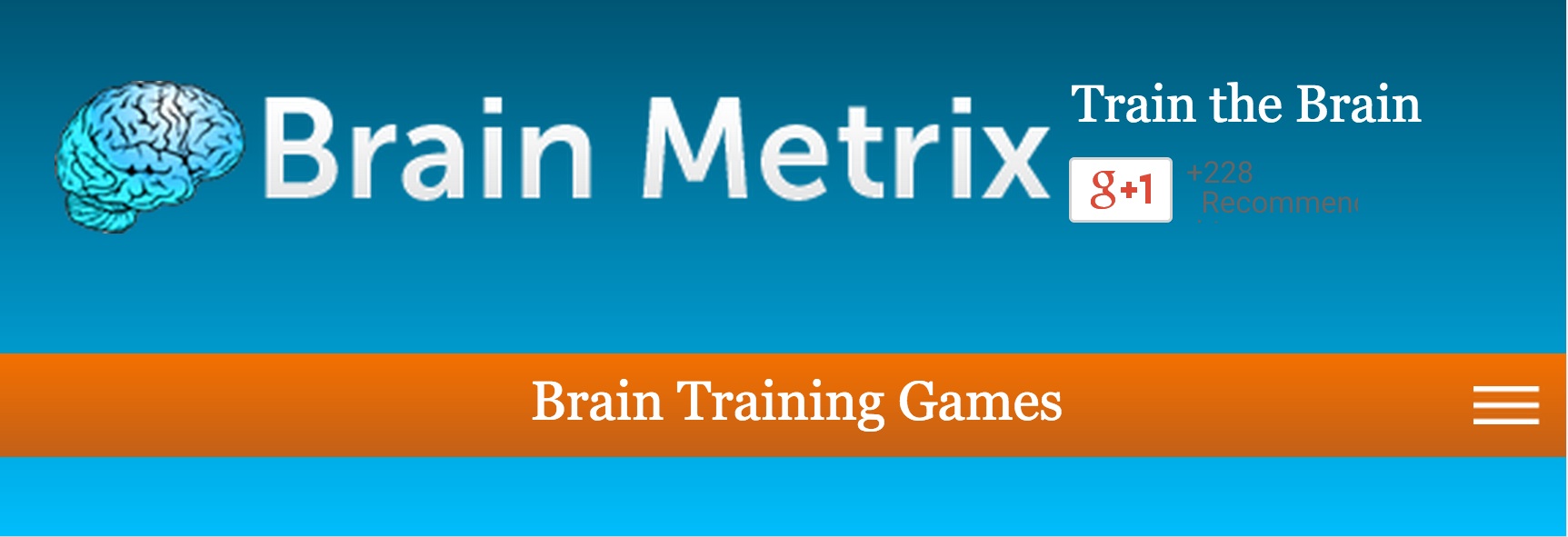
7.6.2 Steer Clear of Pseudoscience
You’re aware that pseudoscience is featured in many online brain games. So let’s look again at the mock Web site you saw earlier, which is based on many typical “brain training” sites that can be found online. Some common pseudoscientific strategies have been circled in red.
Question 7.9
2B0FPO4lWcS2qkYEoXDInwU5fgQTu6KZlhEhFRuL9FJCUa3bAJx6U82AUtd1X4lmEUl69QQjbYnPevs0km28qYaeqxfS1VQnKP+WaeOWppyN8FXkHj5VO+3DExm+8R59+yxfuUNDlcLDcQVcZ73hAw==• “Scientifically developed” and “neuronal strength”: This is scientific jargon. These expressions are vague and have no specific meaning.
• “Unleash your brain’s full power”: This is an irrefutable claim. There’s no way to demonstrate that you’re not using your brain’s full power.
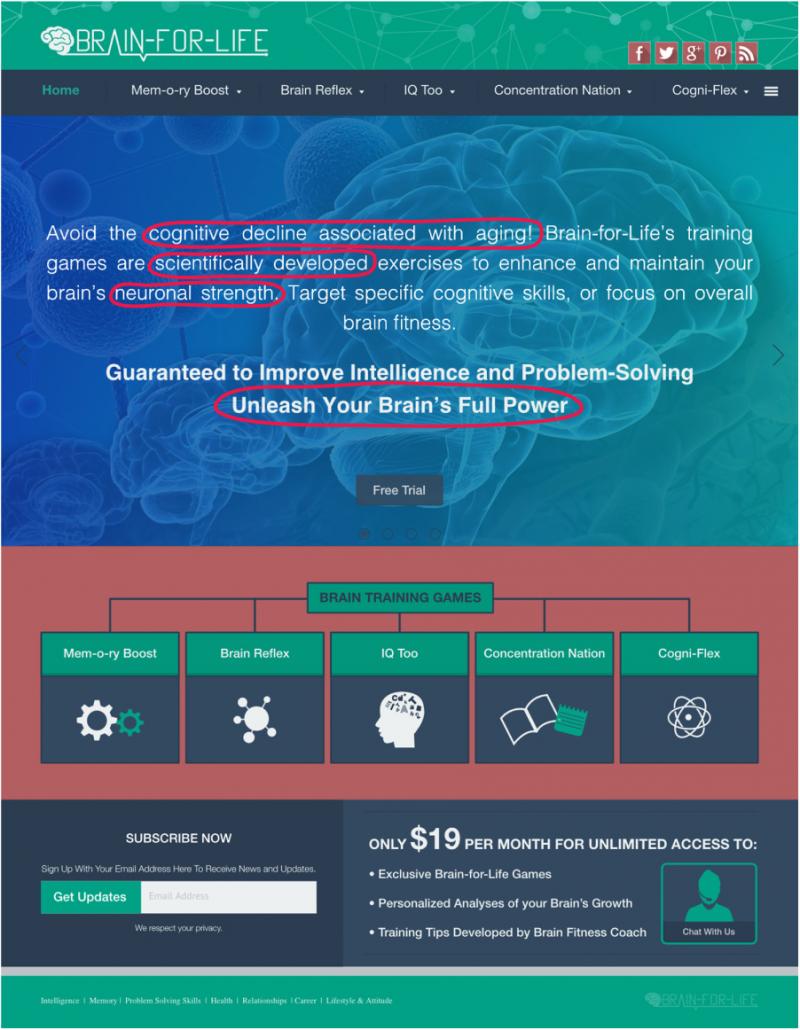
Some sites are better than this one. When you look at a “brain training” site, think like a scientist and consider whether it has ties to legitimate educational or scientific enterprises. Look for the credentials of the staff. Are they researchers? Do they have associations with universities? What degrees do they have? You can also look for references to actual scientific findings. Are there references to peer-reviewed journal articles? Are these findings specific to the training on this particular site, or are they more general?
7.6.3 A Consensus on Brain Games?
Ultimately, even with better Web sites, you should approach “brain training” claims with a critical eye. A group of more than 70 internationally known cognitive psychologists and neuroscientists recently released a summary of what is currently known about brain games. Here is the concluding statement from their overview, which was published jointly by the Max Planck Institute for Human Development and the Stanford Center on Longevity (“A Consensus on the Brain Training Industry from the Scientific Community,” 2014):
We object to the claim that brain games offer consumers a scientifically grounded avenue to reduce or reverse cognitive decline when there is no compelling scientific evidence to date that they do. The promise of a magic bullet detracts from the best evidence to date, which is that cognitive health in old age reflects the long-term effects of healthy, engaged lifestyles. In the judgment of the signatories below, exaggerated and misleading claims exploit the anxieties of older adults about impending cognitive decline. We encourage continued careful research and validation in this field.
7.6.4 Train Your Brain?
It’s up to you to decide whether to play brain games. Although the current scientific consensus is that there’s not enough evidence to support their effectiveness, it seems unlikely that they are harmful. So, play them if you enjoy them. Before you spend any money, however, consider the advice of Murali Doraiswamy of the Duke Institute for Brain Sciences: “I’m not convinced there is a huge difference between buying a $300 subscription to a gaming company versus you yourself doing challenging things on your own, like attending a lecture or learning an instrument” (Parker-Pope, 2014). And as you learned in your textbook chapters on neuroscience and behavior, and lifespan development, physical exercise is also well-documented to improve cognitive functioning at any age. It just might be enough to seek out your own challenges.


7.7 Assessment
Assessment